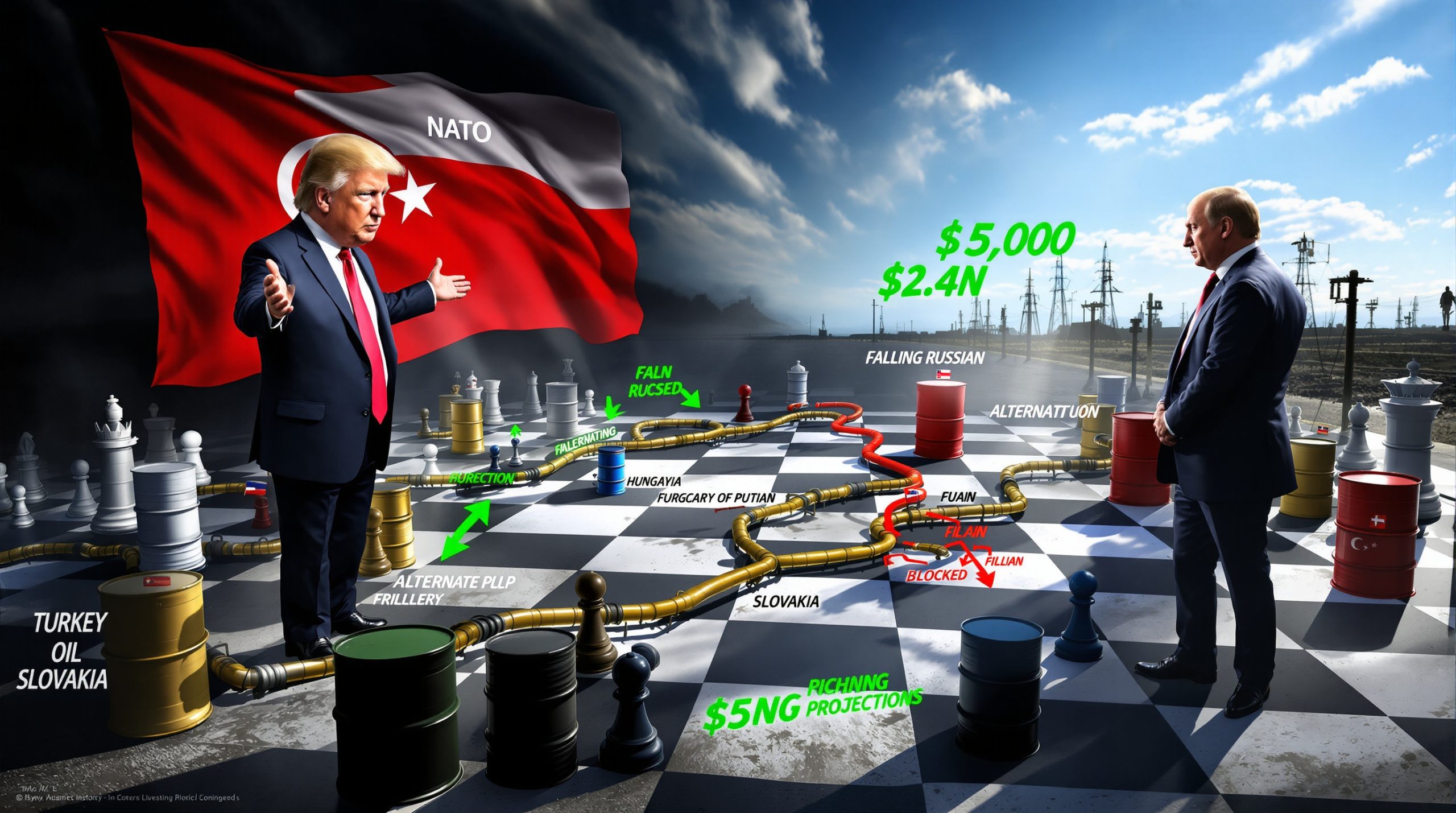Trump's NATO Oil Ban Push: Reshaping Global Energy Markets The geopolitical landscape faces significant disruption as potential changes to NATO energy policy unfold. A push for NATO countries to halt Russian oil imports represents a strategic move that could fundamentally reshape global energy markets while intensifying economic pressure on Moscow. However, this ambitious proposal faces substantial implementation challenges across multiple fronts. What Is Being Proposed to NATO Members? The call for NATO nations to cease Russian oil imports specifically targets the three remaining importers within the alliance: Turkey, Hungary, and Slovakia. This strategic proposal aims to tighten economic pressure on Russia by cutting off a crucial revenue stream that helps finance its military operations. The proposal contains two key components: Complete cessation of Russian oil purchases by all NATO members Potential implementation of 50-100% tariffs on China for its support of Russia's war efforts This approach represents a significant escalation of economic measures against Russia's energy sector, going beyond existing sanctions to create a more comprehensive economic isolation strategy. Which NATO Countries Still Import Russian Oil? Turkey: The Largest NATO Importer Turkey stands as the third-largest global importer of Russian oil, with some refineries sourcing up to 90% of their crude from Russia. This relationship is driven by several key factors: Heavily discounted prices on Russian crude oil Established refining infrastructure optimized for Russian oil grades Strategic position allowing Turkey to refine Russian crude and sell petroleum products to European markets Limited alternative supply options without significant infrastructure investment As Petras Kanitas from the Center for Research on Energy and Clean Air notes: "Turkey buys Russian oil mainly because it's heavily discounted. They also benefit by refining Russian crude oil and selling fuel products to Europe." Hungary and Slovakia: Pipeline Dependency Both countries rely heavily on the Druzhba pipeline system, citing technical constraints for their continued imports: Both receive nearly all their crude via the Soviet-era Druzhba pipeline Hungarian officials have stated that supply alternatives are limited Recent Ukrainian strikes on the pipeline have highlighted vulnerability Both countries secured exemptions from EU sanctions due to their claimed dependency Is Russian Oil Dependency a Technical or Political Issue? Energy analysts point to evidence suggesting the dependency argument may be overstated: Country Technical Reality Political Position Czech Republic Successfully divested from Russian oil after 2022 Made commitment and fulfilled it Hungary Has access to the Adria pipeline through Croatia Claims Druzhba dependency is unavoidable Slovakia Could utilize alternative supply routes Maintains Russian imports are essential According to Tamas Pletser, oil analyst at Erste Bank: "Diversification is not an insoluble technical problem but a matter of political and economic will." The Czech Republic's example is particularly instructive. As energy analysts point out, the Czech Republic successfully ended Russian oil imports by December 2022, demonstrating that technical solutions exist when political will is present. How Would Oil Market Dynamics Change? Immediate Market Effects If NATO members comply with the demand to halt Russian oil imports, several market shifts would likely occur: Russia would need to offer deeper discounts to remaining buyers like China and India Global oil price rally insights would increase during the transition period Turkey's refining sector would face significant adjustment costs Alternative suppliers (Middle East, US, Africa) would see increased demand Based on current market data, Brent crude oil prices have averaged $82.19 per barrel in 2024 (ICE Futures Europe). Any major disruption to Russian export patterns could create short-term price spikes as markets adjust. Long-Term Strategic Implications The broader energy landscape would see structural changes: Acceleration of Europe's energy diversification away from Russian sources Strengthened position for alternative suppliers like Saudi Arabia and the United States Potential development of new pipeline infrastructure connecting Central Europe to Mediterranean ports Increased importance of LNG terminals for European energy security The EU oil embargo on Russian seaborne crude, implemented in December 2022, already led to an estimated 90% reduction in Russian oil imports to the EU (European Commission, 2024). A complete NATO ban would build on these existing measures. What Are the Geopolitical Challenges to Implementation? Several factors complicate the implementation of the proposal: Turkey's Unique Position Turkey faces distinct challenges compared to other NATO members: Not bound by EU sanctions framework Strong economic ties with Russia beyond energy Strategic position controlling Black Sea access Refineries technically optimized for Russian crude grades Turkey's imports of approximately 180,000 barrels per day of Russian crude in early 2024 (Energy Intelligence, 2024) would need to be replaced through alternative supply arrangements. Hungary's Political Alignment Hungarian leadership presents special considerations: Close relationship with both Western and Eastern powers History of securing exemptions from EU energy policies Domestic political narrative centered on energy independence Potential to seek waivers from any new restrictions According to the European Commission's 2024 reports, Hungary imported approximately 65% of its crude oil from Russia via the Druzhba pipeline as of early 2024. China Tariff Complications The proposed tariffs on China create additional complexity: Beijing has warned of "firm countermeasures" against any NATO tariffs European economies heavily depend on Chinese trade Existing trade war oil movements would intensify Implementation would require coordinated action across NATO Chinese customs data shows that Russian oil exports to China reached 1.76 million barrels per day in 2024, highlighting the scale of the economic relationship between the two countries. What Alternative Supply Options Exist? For countries seeking to diversify away from Russian oil, several alternatives exist: Pipeline Alternatives Adria Pipeline: Connects Croatia's Adriatic coast to Hungary and Slovakia with an estimated capacity of 300,000 barrels per day (Croatian energy ministry, 2024) TAP/TANAP System: Brings Azerbaijani oil to Southern Europe Druzhba Western Branch: Could deliver non-Russian oil from Poland Maritime Options Mediterranean Terminals: Greek and Italian ports could supply Central Europe Baltic Ports: Enhanced capacity at Polish and Lithuanian facilities Black Sea Routes: Romanian and Bulgarian terminals as entry points The Druzhba pipeline system has a capacity of approximately 1.2 million barrels per day through its southern branch to Hungary and Slovakia (Transneft data, 2024), providing context for the scale of alternative infrastructure needed. How Would This Affect Global Oil Prices? Market analysts project varied price impacts depending on implementation: Short-term: Potential 3-5% price increase during transition period Medium-term: Stabilization as supply chains adjust Long-term: Minimal price impact once new supply patterns establish Regional differences: European prices likely to see larger increases than global benchmarks The price effects would be moderated by global production capacity and strategic petroleum reserves. What Are the Economic Implications for Russia? Russian oil export revenue would face significant pressure: Estimated $15-20 billion annual revenue loss if all NATO imports cease Increased transportation costs to reach alternative markets Deeper discounts required to attract new buyers Accelerated investment in alternative export infrastructure to Asia These factors would intensify existing economic challenges from Western sanctions. How Does This Compare to Previous Energy Sanctions? The proposed oil ban represents an evolution of energy sanctions strategy: Sanction Approach Target Effectiveness Challenges EU 2022 Oil Ban Russian seaborne exports Reduced revenue but allowed pipeline exceptions Created uneven compliance Price Cap Mechanism Russian oil sold above $60/barrel Limited impact due to shadow fleet development Enforcement difficulties NATO Proposal All Russian oil to NATO countries Would close remaining European market Implementation requires political will What Are Experts Saying About Feasibility? Energy security specialists offer mixed assessments: Benjamin Hilgenstock, senior economist at the KSE Institute, notes: "For Turkey, ending imports will be somewhat of a challenge, as it would be for Hungary and the Slovak Republic, which have taken no steps whatsoever to diversify their supplies." According to Bruegel Institute analysis (2024), Hungary and Slovakia's exemptions from EU oil sanctions were granted due to claimed infrastructure constraints and lack of alternative supply routes. However, many energy experts dispute whether these constraints are as limiting as claimed. FAQ: NATO Oil Ban Proposal Would this ban include refined petroleum products from Russia? Yes, a comprehensive ban would include both crude oil and refined products like diesel and gasoline. How quickly could NATO countries realistically implement such a ban? Estimates range from 6-18 months depending on infrastructure investments and alternative supply arrangements. What leverage exists to enforce this policy? The primary leverage comes from potential secondary sanctions against non-compliant countries and broader trade relationships. How might Russia respond to such a ban? Russia would likely accelerate pipeline and port development to Asian markets while potentially retaliating through non-energy sectors. Would this ban affect natural gas imports as well? The current proposal focuses specifically on oil, though some NATO countries have separately increased Russian LNG imports. Market Analysis: Potential Winners and Losers Potential Market Winners Alternative oil producers: Middle Eastern producers, US shale operators, and North Sea stakeholders could see increased demand Infrastructure developers: Companies building alternative pipelines and terminals Energy security consultants: Firms helping countries transition away from Russian energy sources Shipping companies: Tanker operators would benefit from longer shipping routes as Russian oil heads to Asian markets Potential Market Losers Russian energy companies: Reduced market access and lower profits Specific European refiners: Facilities optimized for Russian crude would face transition costs Energy-intensive industries in affected countries: Higher energy costs during transition period Consumers in import-dependent countries: Potential short-term price increases Furthermore, the OPEC production impact would be significant as the organization might need to adjust output to compensate for market disruptions. In addition, the US economy & tariffs situation would face new complications, potentially leading to increased inflation. The broader US-China trade war impact would ripple through global markets, affecting everything from commodity prices to supply chains. Disclaimer This analysis reflects current market conditions and geopolitical realities which may change rapidly. Energy markets are subject to multiple variables including supply disruptions, regulatory changes, technological developments, and geopolitical events. Readers should consult energy market specialists before making significant investment or policy decisions based on this information. Want to Get Ahead of the Next Mining Discovery? Stay informed on major ASX mineral discoveries as they happen with Discovery Alert's proprietary Discovery IQ model, delivering real-time alerts on significant developments in the mining sector. Understand why historic discoveries can generate substantial returns by visiting Discovery Alert's dedicated discoveries page and begin your 30-day free trial today to position yourself ahead of the market.

PDVSA Citgo Auction: Venezuela’s Oil Asset Battle Intensifies
Discover how Venezuela’s PDVSA Citgo faces forced auction, reshaping global



